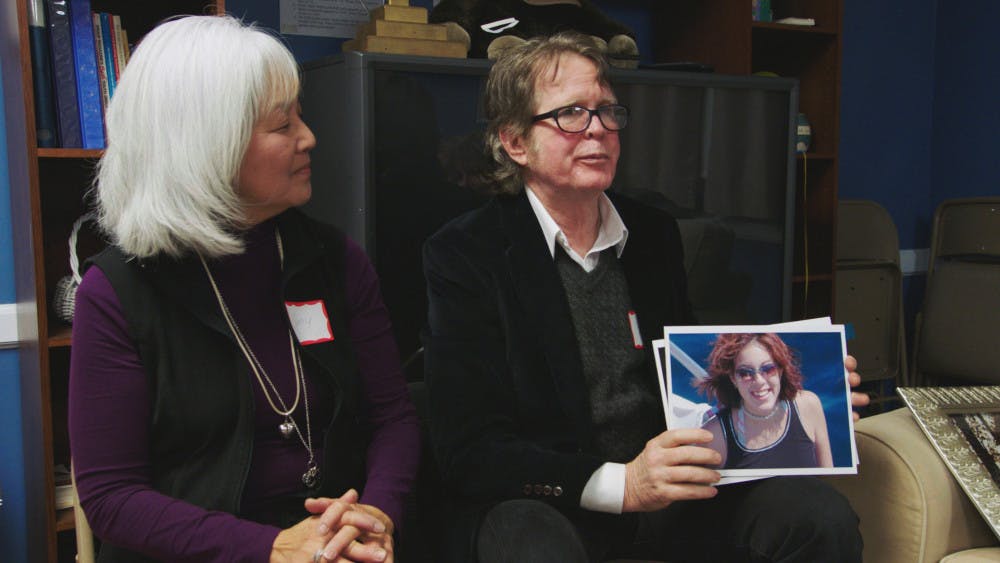One of the most highly abused types of drugs in the United States is not bought on the street — it is prescribed by a doctor. This is what Perri Peltz ’82 P’19 set out to illuminate in her new documentary “Warning: This Drug May Kill You,” which premiered in Sayles Hall April 12. The movie will be released to the public May 1.
The HBO documentary set out to both bring awareness to the ongoing opioid epidemic in the country and generate a sense of empathy. “What I hope that we have done in this film is to provide a story of the humanity of people who are suffering. This is not a problem of drug abuse — this is a problem of addiction. These are good people who develop addictions to highly addictive drugs,” Peltz said.
The opening scene of the film shows a montage of people who are high on opioids passing out in a number of scenarios. One person was sitting on a bus, one was driving a car and another was in the store with their child.
This was the first public screening of the film as well as the first time Peltz herself had seen the final product. “What we tried to do with this film is show the human side of (opioid addiction),” Peltz said, adding, “All too often we want to say that it’s happening to other people. Unfortunately, that’s not the case.”
The film was followed by a panel that was, along with Peltz, hosted by Nicole Alexander-Scott, director of the Rhode Island Department of Health; Josiah Rich, professor of epidemiology as well as a member of Rhode Island’s Overdose Prevention and Intervention Task Force and Rebecca Boss, director of the Department of Behavioral Healthcare. They answered audience questions and provided their own perspectives on the epidemic.
The documentary itself centered on four families, each coping with various forms of opioid addiction. While the subjects of these stories were all prescribed painkillers for different reasons, they were similar in one regard: They never intended to become addicted.
The film showcased in harrowing detail the ways in which prescription opioids ruin the lives of both those who take them and their families. The first story revolved around a girl named Stephany, who was prescribed painkillers when she was a teenager in order to cope with pain caused by kidney stones. The other stories were all told from the perspective of families who had already lost someone to opioids and depicted the grief they were attempting to overcome.
According to the documentary, 91 people die from opioids every day in the United States, and opioid deaths have quadrupled since 1999.
Rich explained that when one takes opioids, they begin to require more and more, and eventually an addiction forms, sometimes in under a week. As was the case in the documentary, people who are addicted will begin to take much more than was initially prescribed and sometimes even turn to heroin in order to increase their high.
When one stops taking opioids, they go into withdrawal, Rich said. This affects the “reptilian” part of the brain, which causes them to want to take opioids again. Rich likens this experience to someone holding their breath: Eventually, survival instincts will activate and force them to breathe. This is why the majority of opioid users who quit end up relapsing.
Despite the debilitating effects of the opioid epidemic, both the documentary and the panel discussed the methods that are in place to help people rehabilitate. Peltz discussed the use of Narcan, which is used to revive people who have overdosed on opioids. “People are actually dying, and (Narcan) is able to kick the opioid off of the receptors, and people are able to come back to life,” Peltz said.
While Rhode Island is one of the states most affected by opioids, Peltz says that it is also one of the leading states in the country in regard to combating the opioid epidemic. She noted the availability of Narcan and the restrictions in place for the prescription of opioids.
Peltz put particular focus on the stigma surrounding opioid addiction, pointing out that people sometimes wonder why addicts who continually overdose are being revived. Peltz stressed that the epidemic is not a case of bad people abusing good drugs, nor is it a moral failing; rather, it is a case of addiction, a brain disorder, to which she hopes the film will bring awareness.





